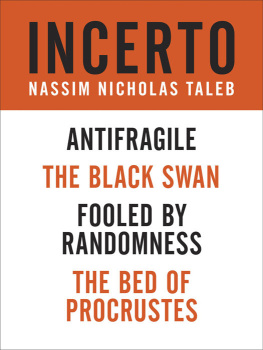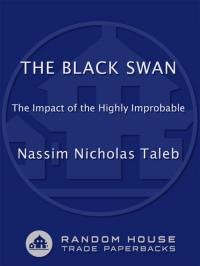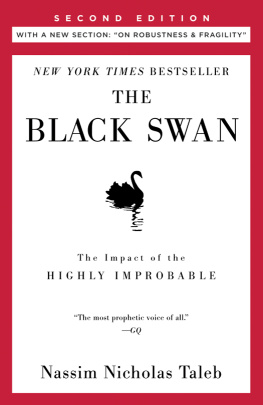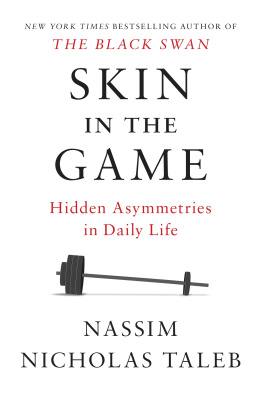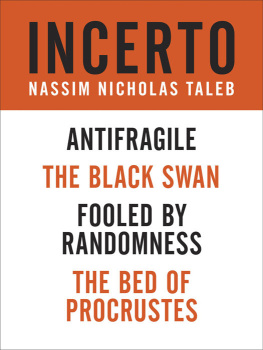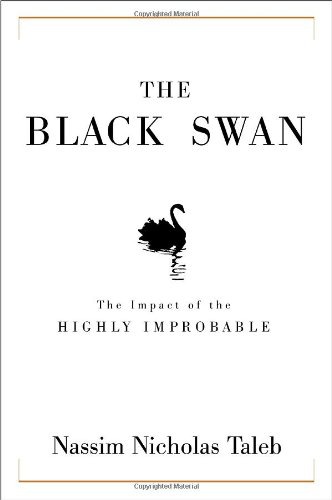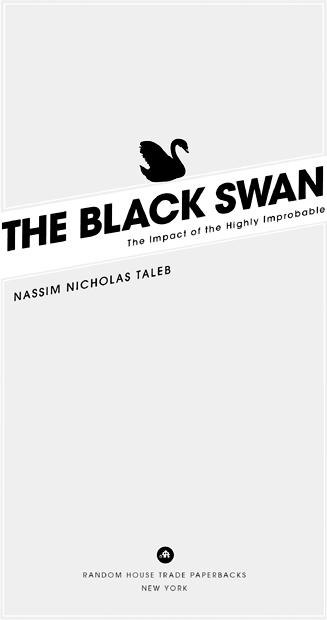PRAISE FOR THE BLACK SWAN

Taleb not only has an explanation for [the crisis], he saw it coming.
D AVID B ROOKS , The New York Times
The hottest thinker in the world.
B RYAN A PPLEYARD , The Sunday Times (London)
Taleb is the real thing. [He] rightly understands that whats brought the global banking system to its knees isnt simply greed or wickedness but intellectual hubris.
J OHN G RAY , author of Straw Dogs (as quoted in GQ)
The new sage The trader turned author has emerged as the guru of the global financial meltdown. Not only is he riding high in the bestseller lists, his theory of black swan events has become the most seductive guide to our uncertain times.
The Observer
[Taleb writes] in a style that owes as much to Stephen Colbert as it does to Michel de Montaigne.
The Wall Street Journal
[This] is the lesson of Nassim Taleb and also the lesson of our volatile times. There is more courage and heroism in defying the human impulse, in taking the purposeful and painful steps to prepare for the unimaginable.
M ALCOLM G LADWELL , author of The Tipping Point
[Taleb is] a genuinely significant philosopher someone who is able to change the way we view the structure of the world through the strength, originality and veracity of his ideas alone.
GQ
Long-standing critics of risk-modelling, such as Taleb are now hailed as seers.
The Economist
A provocative macro-trend tome in the tradition of The Tipping Point.
Time
An eye-opening book, one that teases our intelligence He is after big game, and he bags it.
R OGER L OWENSTEIN , Portfolio
Erudite advice The Black Swan is a richly enjoyable read with an important message.
Business Week
Engrossing a lively, sassy study of whats not known.
F RANK W ILSON , The Philadelphia Inquirer
[An] engaging new book The Black Swan has appealing cheek and admirable ambition.
The New York Times Book Review
A rigorous meditation on the modern world.
The Daily Telegraph (London)
Funny, quirky and thought-provoking [Taleb is] engaging, lively and intelligent.
The Sunday Times (London)
ALSO BY NASSIM NICHOLAS TALEB
Fooled by Randomness
To Benot Mandelbrot,
a Greek among Romans
CONTENTS
PART ONE:

Chapter 1:
Chapter 2:
Chapter 3:
Chapter 4:
Chapter 5:
Chapter 6:
Chapter 7:
Chapter 8:
Chapter 9:
PART TWO:

Chapter 10:
Chapter 11:
Chapter 12:
Chapter 13:
PART THREE:

Chapter 14:
Chapter 15:
Chapter 16:
Chapter 17:
Chapter 18:
PART FOUR:

Chapter 19:

NOTE TO THE SECOND EDITION
In order to preserve the integrity of the original text, I have limited the updating of the current edition to a small number of footnotes. I added a long Postscript essay, going deeper into philosophical and empirical discussions of the subject and addressing some misunderstandings of the concept of the Black Swan that cropped up after the initial publication of the book.
PROLOGUE
ON THE PLUMAGE OF BIRDS
Before the discovery of Australia, people in the Old World were convinced that all swans were white, an unassailable belief as it seemed completely confirmed by empirical evidence. The sighting of the first black swan might have been an interesting surprise for a few ornithologists (and others extremely concerned with the coloring of birds), but that is not where the significance of the story lies. It illustrates a severe limitation to our learning from observations or experience and the fragility of our knowledge. One single observation can invalidate a general statement derived from millennia of confirmatory sightings of millions of white swans. All you need is one single (and, I am told, quite ugly) black bird.
I push one step beyond this philosophical-logical question into an empirical reality, and one that has obsessed me since childhood. What we call here a Black Swan (and capitalize it) is an event with the following three attributes.
First, it is an outlier, as it lies outside the realm of regular expectations, because nothing in the past can convincingly point to its possibility. Second, it carries an extreme impact (unlike the bird). Third, in spite of its outlier status, human nature makes us concoct explanations for its occurrence after the fact, making it explainable and predictable.
I stop and summarize the triplet: rarity, extreme impact, and retrospective (though not prospective) predictability. A small number of Black Swans explain almost everything in our world, from the success of ideas and religions, to the dynamics of historical events, to elements of our own personal lives. Ever since we left the Pleistocene, some ten millennia ago, the effect of these Black Swans has been increasing. It started accelerating during the industrial revolution, as the world started getting more complicated, while ordinary events, the ones we study and discuss and try to predict from reading the newspapers, have become increasingly inconsequential.
Just imagine how little your understanding of the world on the eve of the events of 1914 would have helped you guess what was to happen next. (Dont cheat by using the explanations drilled into your cranium by your dull high school teacher.) How about the rise of Hitler and the subsequent war? How about the precipitous demise of the Soviet bloc? How about the consequences of the rise of Islamic fundamentalism? How about the effect of the spread of the Internet? How about the market crash of 1987 (and the more unexpected recovery)? Fads, epidemics, fashion, ideas, the emergence of art genres and schools. All follow these Black Swan dynamics. Literally, just about everything of significance around you might qualify.


